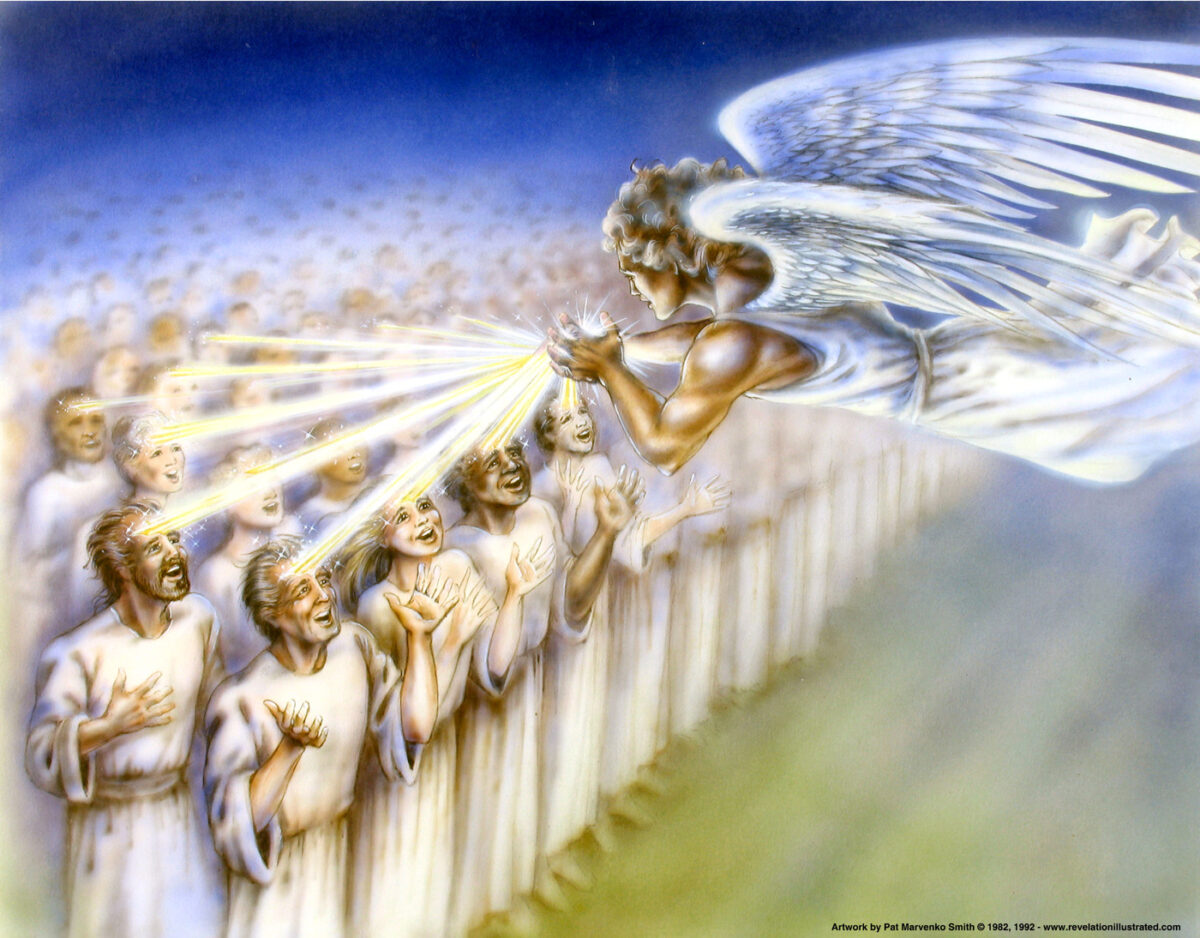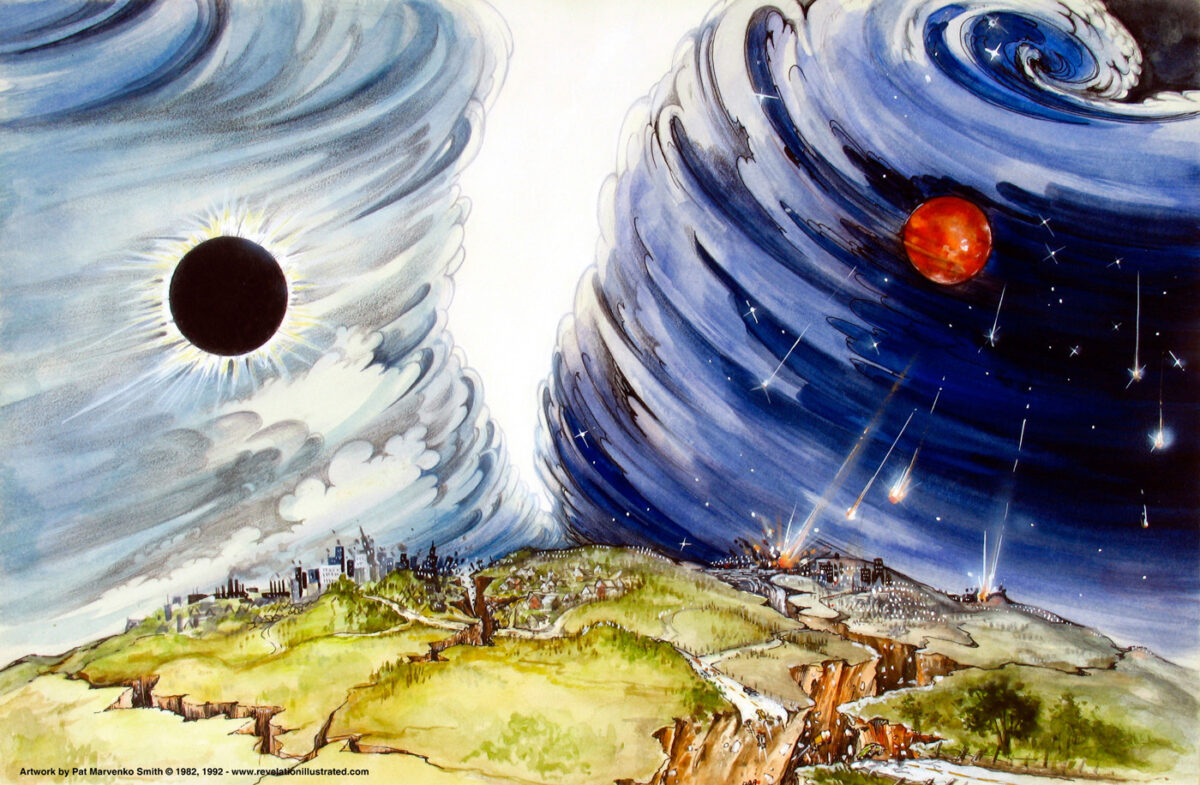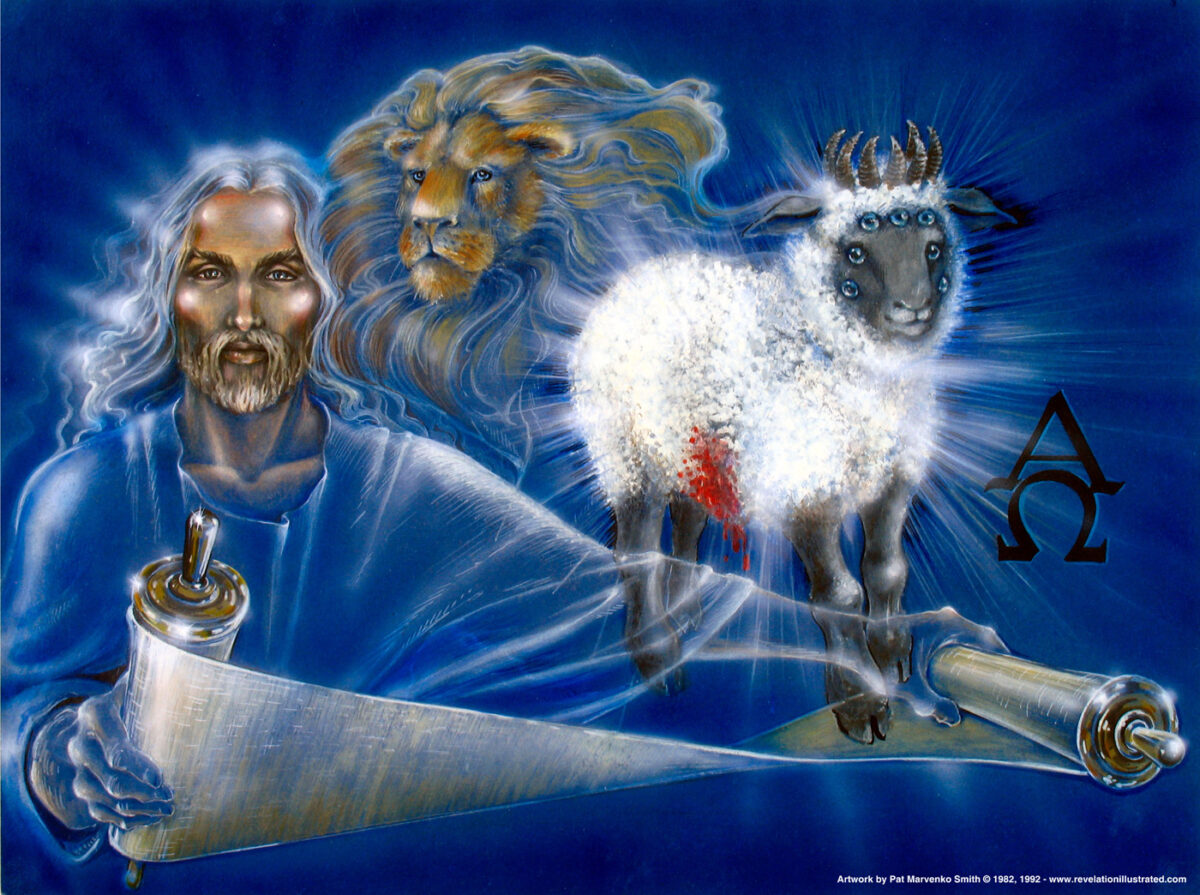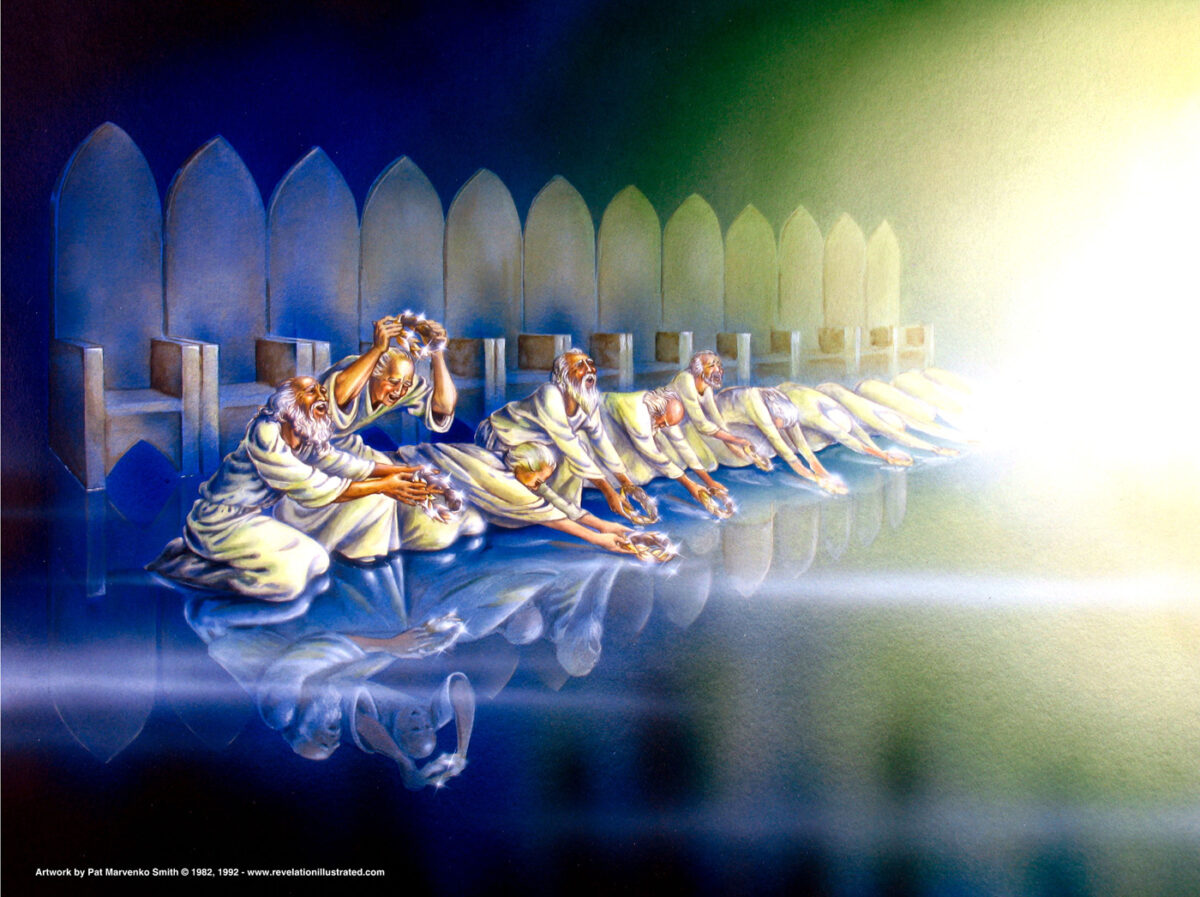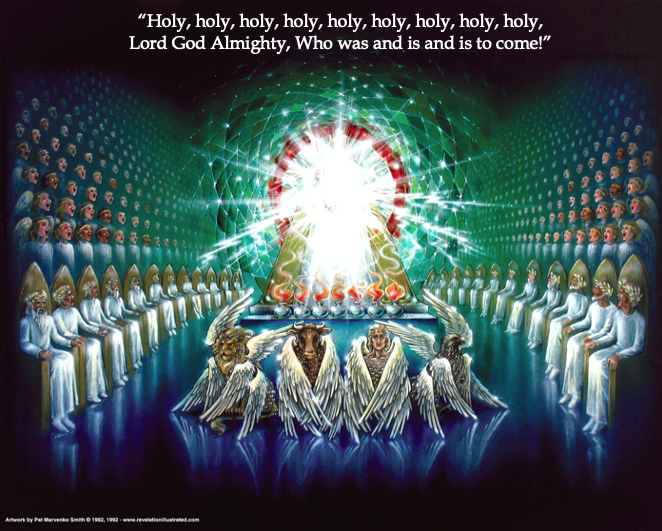“And I heard the number of those who were sealed. One hundred and forty-four thousand of all the tribes of the children of Israel were sealed.” Revelation 7:4
John received two new visions that corrected the possible impression that no one would survive the “beginning of birth-pangs” (Matthew 24:6-8) during the first half of the Tribulation judgments (Revelation 6:1-17). God will save two groups of people during the first half of the Tribulation (cf. Matthew 24:14): He will preserve 144,000 Israelites alive on the earth (7:1-8), and He will take to heaven a multitude of people from all nations who will die during that time (7:9-17). John saw both groups in chapter 7, which contrasts the panic of unbelievers described in Chapter 6 (“After these things”) and in answer to the question “Who is able to stand?” (6:17), with the security of believers during this time of unprecedented suffering (7:1a). 1
“The mention of martyrs during the Tribulation (6:9-11) leads John to write about what will happen to those who become believers during that time. Though billions of unbelievers will die, many will come to faith in Christ and many of those will be martyred for their faith in Him. In wrath, God will remember mercy (cf. Hab 3:2). Even though this will be a time of trouble like never before, it will also be a time of salvation like never before—of both Jews (vv 1-8) and Gentiles (vv 9-17).” 2
“As the hoofbeats of the four horsemen echoed into the distance and the cacophony of geological and cosmic upheavals stilled, John’s attention turned to the center of the earthly end-times drama: the land of Israel. Throughout their history, the people of Israel had been conquered, delivered, devastated, exiled, and restored over and over again as military threats bombarded them from every side. Yet at the beginning of John’s vision of the Tribulation, just as the land of Israel is about to endure the most devastating war in all of history, God’s intervention reminds us that He will keep His promises to Israel.” 3
In between the sixth and seventh seals of judgment, John writes, “After these things I saw four angels standing at the four corners of the earth, holding the four winds of the earth, that the wind should not blow on the earth, on the sea, or on any tree.” (Revelation 7:1). The apostle “saw four angels standing at the four corners.” The phrase “four corners of the earth,” is an idiom for the four cardinal directions 4 – north, south, east, and west. 5
The four angels in John’s vision have the responsibility of restraining the judgment of God (pictured by “the four winds,” cf. Jeremiah 49:36-38; Daniel 7:2; Hosea 13:15) on nature (“the earth…the sea…any tree”). Most of the trumpet and bowl judgments involve God’s destruction of the earth’s environment in some way (cf. Revelation 8–9, 16). However, as Revelation 11:14 indicates, the first six trumpet judgments take place before the 144,000 go out to preach in the last half of the seven years. 6
Then John sees another angel in addition to the first four: “2 Then I saw another angel ascending from the east, having the seal of the living God. And he cried with a loud voice to the four angels to whom it was granted to harm the earth and the sea, 3 saying, ‘Do not harm the earth, the sea, or the trees till we have sealed the servants of our God on their foreheads.’” (Revelation 7:2-3). “Another” [allon] angel” of the same kind as the first four angels ascended “from the east” (literally – “from the rising of the sun”). In the Bible, divine salvation often comes “from the east” (cf. Genesis 2:8; Ezekiel 43:2; Matthew 2:1; 2 Peter 1:19; Revelation 22:16). 7
This fifth angel had “the seal of the living God.” A “seal” was a symbol of ownership (2 Corinthians 1:22), authentication (John 6:27), and protection leading to final salvation (Ephesians 1:14; 4:30; cf. Genesis 4:15; Exodus 12:7). 8 This “seal” represents God’s intention to protect the twelve tribes of Israel that are mentioned in verses 4-8, much as He protected Noah from the Flood, Israel from the plagues of Egypt, and Rahab and her household in Jericho. 9
“In Ezekiel 9, a linen-clothed angel went forth and put a mark on a select group of people to set them apart from those on whom God’s judgment would fall. The same is true here. The purpose of this seal is to set apart those who will share the gospel in the last three-and-a-half years of the Tribulation and to protect them from the judgments that will be falling on unrepentant mankind (cf. 9:4).” 10
On earth during the Tribulation, the followers of the Beast will bear his mark on their right hand or forehead (Revelation 13:16). During this same time, the Lord will identify His people by placing a seal of ownership on their foreheads (Revelation 7:3). Revelation 7 and 13 use two different Greek words to distinguish these marks from each other. In Revelation 7, God seals the 144,000 on their “foreheads.” The word used there for the verb “sealed” is sphragizō, which symbolizes the spiritual sealing mentioned throughout the New Testament (John 3:33; 6:27; 2 Corinthians 1:22; Ephesians 1:13; 4:30). But in Revelation 13, where followers of the Antichrist are given a “mark” (Revelation 13:16-17), the word used is charagma which refers to a literal brand, tattoo, or etching. 11
This angel commands the four angels to whom was given authority “to harm the earth and the sea” to withhold their judgment on the earth until he had finished sealing “the servants of our God on their foreheads” (7:3). God wants His servants set apart and ready before any of the judgments fall on the earth. 12 The “servants” in view are believers in Jesus Christ who are Jews (7:4-8). The sealing of God’s servants sets them apart as God’s redeemed people and guaranteed their physical safety while they preached the gospel during the last 3 ½ years of the Tribulation when the trumpet judgments take place (8:7-21; 11:15-18).
“Evidently God will give these 144,000 believers special protection in the last half of the Tribulation, because its calamities will be much more severe than those in the first half. Antichrist will also mark his followers in a similar way (13:16-18; 14:9, 11; 16:2; 19:20).” 13
Next John writes, “And I heard the number of those who were sealed. One hundred and forty-four thousand of all the tribes of the children of Israel were sealed.” (Revelation 7:4). When God’s Word says, “all the tribes of the children of Israel,” He means it. Unfortunately, “most posttribulationists and amillennialists believe the 144,000 are members of ‘spiritual Israel,’ a title of theirs for the church. 14 “Many interpreters take the number 144,000 as symbolic of all God’s servants in the Tribulation.” 15
Swindoll writes, “Many Christians today are convinced that God’s plan for ethnic Israel has come to an end. Some believe that the promises of a glorious nation and blessing in the Holy Land have been abolished because of Israel’s past unfaithfulness. Others have determined that these promises were fulfilled in a spiritual sense through Christ in the church. Some theologians propose that Israel has been replaced by the church and that ethnic Jews have been divorced by God, without a future in God’s plan.
“However, the New Testament assures us that God plans to bring about the fulfillment of those promises through Jesus Christ. Although most ethnic Jews have been in a state of unbelief since the time of Jesus, God will one day bring a remnant to faith in Christ and restore them to the land promised to their forefathers (Genesis 13:15). Jesus Himself promised the apostles, ‘In the regeneration when the Son of Man will sit on His glorious throne, you also shall sit upon twelve thrones, judging the twelve tribes of Israel’ (Matthew 19:28). Before Christ’s ascension, the disciples eagerly inquired about the timing of that earthly kingdom when they asked, ‘Lord, is it at this time You are restoring the kingdom to Israel?’ (Acts 1:6). It is significant that Jesus didn’t reject their literal interpretation and expectation of a future fulfillment of these earthly promises. Instead, He told them that they would not know the timing of this restoration (Acts 1:7-8).
“Years later, the apostle Paul addressed the problem of Israel’s unbelief by declaring that this rebellion would one day be reversed: ‘A partial hardening has happened to Israel until the fullness of the Gentiles has come in; and so all Israel will be saved’ (Romans 11:25-26). In other words, when God has accomplished His purposes through the church, He will again turn His attention to the nation of Israel and bring them to faith in Christ. We can see the beginnings of this future for Israel with the sealing of the 144,000 in Revelation 7:1-8.
“Why is the restoration of Israel so important? Because God’s very reputation as a Promise Keeper is at stake! With explicit reference to the calling of Israel, Paul said, ‘For the gifts and the calling of God are irrevocable’ (Romans 11:29). It’s as simple as this: If we cannot trust God to keep His promises to Israel (Jeremiah 31:35-37), how can we trust Him to keep His promises to us (Romans 8:35-39)? Never doubt it: God will do what He says He will do!” 16
That God is referring to ethnic Israel is underscored by the fact that John heard the names of twelve tribes of Israel with 12,000 from each tribe “sealed” and thus protected: “5 of the tribe of Judah twelve thousand were sealed; of the tribe of Reuben twelve thousand were sealed; of the tribe of Gad twelve thousand were sealed; 6 of the tribe of Asher twelve thousand were sealed; of the tribe of Naphtali twelve thousand were sealed; of the tribe of Manasseh twelve thousand were sealed; 7 of the tribe of Simeon twelve thousand were sealed; of the tribe of Levi twelve thousand were sealed; of the tribe of Issachar twelve thousand were sealed; 8 of the tribe of Zebulun twelve thousand were sealed; of the tribe of Joseph twelve thousand were sealed; of the tribe of Benjamin twelve thousand were sealed.” (Revelation 7:5-8). Nothing in this text suggests a symbolic understanding. The fact that specific “tribes” were named “and specific numbers from each tribe were indicated would seem to remove this from the symbolic and to justify literal interpretation. If God intended these verses to represent Israel literally, He would have used this means. Nowhere else in the Bible do a dozen references to the 12 tribes mean the church. Obviously, Israel will be in the Tribulation, and though men do not know the identification of each tribe today, certainly God knows.” 17
The number of sealed servants of God, with specific numbers from each tribe in contrast with the indefinite number of 7:9, underscores the literal understanding of these verses. “If it is taken symbolically, no number in the book can be taken literally.” 18
Hitchcock gives several reasons why the church cannot represent Israel in Revelation 7:1-8: “Why would the Holy Spirit begin to mix the church and Israel in the book of Revelation, the final book in the New Testament, when He has so carefully distinguished the two groups in the previous twenty-six books of the New Testament? Why begin to identify the church as the true, spiritual Israel at this late point in the New Testament? It does not make good sense and is inconsistent.
“Second, if one holds to the pre-Tribulation timing for the Rapture, the church is already in heaven as pictured by the twenty-four elders in Revelation 4–5. Thus, it doesn’t make sense that the group in Revelation 7, which is on earth, would be the church. The church has already been raptured.
“Third, it is interesting that Jews and Gentiles are clearly distinguished from one another in Revelation 7. The 144,000 Jews are listed in 7:1-8 while 7:9-17 presents an innumerable host of ‘every nation and tribe and people and language.’ Merging these two groups does not do justice to the distinctions that Revelation 7 makes:
“Jews from twelve tribes of Israel (Revelation 7:1-8), Gentiles from every nation, tribe, people, and language (Revelation 7:9-17); numbered—144,000 (Revelation 7:1-8), not numbered—“a great multitude which no one could count” (Revelation 7:9-17); standing on earth (Revelation 7:1-8), standing before God’s throne (Revelation 7:9-17); sealed for protection (Revelation 7:1-8), ascended after persecution (Revelation 7:9-17).
“Furthermore, Revelation 7 clearly distinguishes between Jews and Gentiles, but this distinction is inconsistent with the New Testament picture of the church—Jews and Gentiles are seen as one in the body of Christ (Galatians 3:27-28; Ephesians 3:6). Since Galatians 3 and Ephesians 3 unite Jews and Gentiles as one and since Revelation 7 does not reflect that unity, the Rapture must reinstitute a division between Jews and Gentiles. Revelation 7 reflects that division.
“So then, who are these 144,000 servants of God? If the Scriptures are interpreted literally, then the 144,000 are a literal group of 144,000 Jewish men—12,000 from each of the twelve tribes of Israel—raised up by God during the Tribulation to serve Him. They are not spiritual Israel (the church), but actual Israel.” 19
“The most important fact taught here is that God continues to watch over Israel even in the time of Israel’s great distress. There is no justification whatever for spiritualizing either the number or the names of the tribes in this passage, to make them represent the church.” 20
In conclusion, God’s faithfulness to His promises is seen in the fact that ethnic Israel will retain her national identity before God during the Tribulation period, and He will resume dealing with them again as His chosen people during this time (7:1-8; cf. Daniel 9:24-27). Jehovah Witnesses or any other Gentiles who claim to be a part of this group fail to accept the final authority of God’s Word which clearly states that these 144,000 servants of God will be physical descendants of the twelve Israelite tribes. When they are sealed (7:1-8), they will know their tribal roots, and their sealing will take place after the Rapture of the Church (4:1-4).
How can we apply this to our lives today? Just as God prepared the 144,000 Jewish servants for service by giving them His seal (7:2-8), so God has prepared us for His service by giving us the Holy Spirit to empower us to be His witnesses to the entire world (Acts 1:8). We are not alone when it comes to sharing the gospel with a lost world. God the Holy Spirit indwells us (John 14:16-17) and will give us the boldness (Acts 4:29-31) and words to speak to those who need Christ in their lives (Matthew 10:19-20).
The 144,000 Jewish servants will boldly proclaim the gospel of Christ’s coming Kingdom during the Tribulation period. There appears to be a cause-and-effect relationship in Revelation 7 between the 144,000 Jewish believers (7:1-8) and the innumerable crowd of Gentile believers in heaven from all nations (7:9-17). The preaching of the gospel by these 144,000 Jewish evangelists during the last half of the Tribulation period will results in an innumerable number of people being saved. They will be the greatest evangelists the world has ever seen. These sealed servants of God will fulfill Matthew 24:14: “And this gospel of the kingdom will be preached in all the world as a witness to all the nations, and then the end will come.” Revelation 7 provides a panorama of God’s saving work during the Tribulation. The 144,000 reveal God’s passion to save people even amid the unspeakable judgments of the Tribulation. To the very end, our Savior will graciously continue “to seek and to save that which was lost.” (Luke 19:10). 21
Does our passion for the lost reflect that of our Savior Who desires all people to be saved and come to the knowledge of the truth (I Timothy 2:3-4)? I am convinced that the closer we grow to the heart of the Lord Jesus, the more our hearts for the lost will reflect His. Christ promises that if we follow Him, He will make us fishers of men (Matthew 4:19). Do you feel inadequate to evangelize the lost? Do you ever think that you do not know enough to share the gospel with non-Christians? Ask the Lord Jesus to help you follow Him daily and He will teach you all you need to know about evangelism. The best way to learn to talk to unbelievers is to walk and talk with Jesus.
Swindoll reminds us that this interlude between the sixth and seventh seal judgments in Revelation 7 teaches us several things: “To reaffirm Christ’s central position, remind us of God’s great plan of redemption, and reassure us that God’s wrath isn’t without mercy. John needed that interlude. So do we. In fact, it might be wise for us to follow God’s example and work interludes into our own lives.
“Interludes do at least three things for us—all of them essential in a world filled with relentless stress, hardship, busyness, and drama.
“First, interludes reaffirm for us who’s first… Interludes strengthen the centrality and preeminence of Christ. When we are alone for even a short period of time, we get a desperately needed opportunity to focus on Him. Strive to make this ‘time with God’ a daily appointment. Consider not only setting aside a few hours on Sunday morning to remember who’s first but also devoting the whole Lord’s Day to Christ-centered activities.
“Second, interludes remind us of what’s important. In the fast pace of modern life, we frequently get our priorities jumbled up. The nonessentials of life tend to bleed over into the essentials—and vice versa. When we pause, step back, and gather our thoughts, we give ourselves a chance to reorder our priorities. Such occasions to ‘regroup’ can be monthly getaways or annual retreats. Each of us is different, but all of us need a chance to reconsider priorities, set things straight, and form a plan to keep life’s essentials on top. Consider dedicating a portion of a vacation to thinking and praying through your priorities. What a difference it will make for the rest of the year!
“Third, interludes refresh us with why it’s all worth it. In the depths of despair, in the thick of tragedy, in the throes of suffering, we need interludes in order to recharge spiritually with the faith and fortitude to carry on. Interludes can help us endure suffering, loss, disappointment, and the death of dreams. They massage us back to a fresh new start. We reenter the fray with a new perspective, centered on God’s goodness and on His plan and purpose. Sometimes we just need a shelter from the storm.
“It’s easy to lose sight of God’s goodness, grace, and mercy in the midst of the daily turmoil of life in this fallen world. Only during interludes of reflection are we able to evaluate our priorities and passions in light of the central position of Jesus Christ, which equips us with a new sense of purpose as we place our trust in Him.” 22
Prayer: Heavenly Father, thank You for this amazing interlude in heaven between the sixth and seventh seal judgments which underscores that Your wrath is accompanied by Your mercy. Only You can give us security amid a world that is spinning out of control. Your judgments can awaken people for their need for Your mercy through the Lord Jesus Christ. Thank You for remaining faithful to Your promises to Israel and to those of us who are Gentiles. We can trust You to keep Your promises no matter how difficult life becomes. Please show us how to work interludes into our own lives that enable us to renew our commitment to Christ. We need to detach from this hostile world and renew our love relationship with Jesus. Make us more like You, Lord Jesus, so Your love for the lost becomes ours. Use us to proclaim Your message of grace through faith to a world that is perishing without You. Protect us from the evil one and equip us with a renewed sense of purpose as we place our trust in You. In Your mighty name we pray, Lord Jesus. Amen.
ENDNOTES:
1. Tom Constable, Notes on Revelation, 2017 Edition, pg. 94.
2. Bob Vacendak; Robert Wilkin; J. Bond; Gary Derickson; Brad Doskocil; Zane Hodges; Dwight Hunt; Shawn Leach. The Grace New Testament Commentary: Revised Edition (Grace Evangelical Society, Kindle Edition, 2019), pp. 1524-1525.
3. Charles R. Swindoll, Insights on Revelation, (Swindoll’s Living Insights New Testament Commentary Book 15, Tyndale House Publishers, Inc., 2014 Kindle Edition), pp. 162-163.
4. Ibid., pg. 163.
5. Tony Evans, CSB Bibles by Holman, The Tony Evans Bible Commentary (B & H Publishing Group, Kindle Edition, 2019), pg. 2382.
6. Vacendak, pg. 1525. Regarding Revelation 11:14, Vacendak says, “Since the death of the two witnesses and the subsequent earthquake occur after the first and second ‘woe’ (i.e., trumpet judgments five and six), one may conclude that the first six trumpet judgments occur during the first three-and-a-half years of the Tribulation” (pp. 1538-1539).
7. Constable, pg. 95.
8. Ibid.
9. John F. Walvoord, The Bible Knowledge Commentary Epistles and Prophecy, Editors John F. Walvoord and Roy B. Zuck, (David C Cook, 2018 Kindle Edition), pg. 164.
10. Vacendak, pg. 1525.
11. Mark Hitchcock, The End: A Complete Overview of Bible Prophecy and the End of Days (Carol Stream, IL: Tyndale House Publishers, Inc., 2012 Kindle Edition), pg. 290.
12. Vacendak, pg. 1525.
13. Constable, pg. 96.
14. Ibid., cites as examples William Barclay, The Revelation of John Vol. 2, The Daily Study Bible series 2nd ed. (Edinburgh: Saint Andrew Press, 1964), pg. 30; Robert H. Mounce, The Book of Revelation, New International Commentary on the New Testament series (Grand Rapids: William B. Eerdmans Publishing Co., 1983), pg. 168; Leon Morris, The Revelation of St. John, Tyndale New Testament Commentary series, Reprint ed. (Leicester, England: Inter-Varsity Press, and Grand Rapids: Wm. B. Eerdmans Publishing Co., 1984), pg. 175; George Raymond Beasley-Murray, The Book of Revelation, New Century Bible Commentary series, Revised ed. (London: Morgan & Scott, 1974; reprint ed., Grand Rapids: Wm. B. Eerdmans Publishing Co., and London: Marshall, Morgan & Scott, 1983), pg. 140; George Eldon Ladd, A Commentary on the Revelation of John, 1972 reprint ed. (Grand Rapids: Wm. B. Eerdmans Publishing Co., 1985), pp. 114 116; Henry Barclay Swete, The Apocalypse of St. John. 2nd ed. (London: Macmillan and Co., Ltd., 1907), pg. 99; James Moffatt, “The Revelation of St. John the Divine,” In The Expositor’s Greek Testament Vol. 5 (1910), 4th ed. Edited by W. Robertson Nicoll 5 Vols. (London: Hodder and Stoughton, 1900-12), pg. 395; Gregory K. Beale, The Book of Revelation: A Commentary on the Greek Text, The New International Greek Testament Commentary series (Grand Rapids: Wm. B. Eerdmans Publishing Co., and Carlisle, England: Paternoster Press, 1999), pg. 413; David E. Aune, Revelation 6—16, Word Biblical Commentary series (Nashville: Thomas Nelson, 1998), pg. 447.
15. Ibid., cites as examples Alan Johnson, “Revelation,” In Hebrews-Revelation Vol. 12 of The Expositor’s Bible Commentary 12 vols., Edited by Frank E. Gaebelein (Grand Rapids: Zondervan Publishing House, 1981), pp. 463 and 481; Ladd, pg. 117.
16. Swindoll, pp. 156-157.
17. Walvoord, pg. 164.
18. Constable, pg. 96 cites Thomas, Revelation 1—7, p. 474.
19. Hitchcock, pp. 288-289.
20. Walvoord, pg. 164.
21. Adapted from Hitchcock, pp. 291-292.
22. Swindoll, pp. 168-169.

